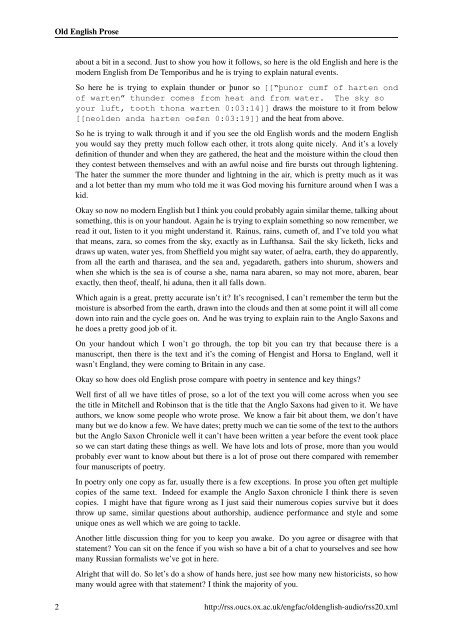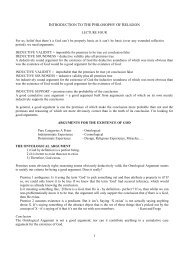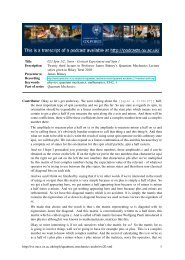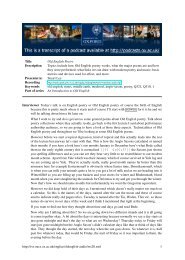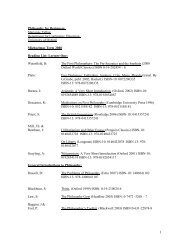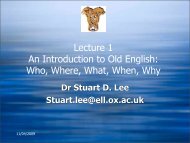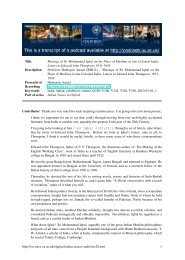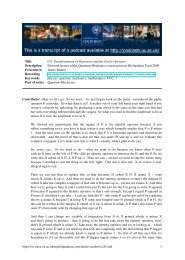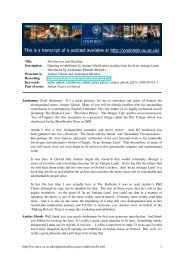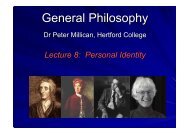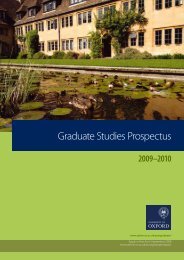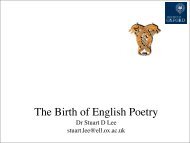Old English Prose - University of Oxford
Old English Prose - University of Oxford
Old English Prose - University of Oxford
You also want an ePaper? Increase the reach of your titles
YUMPU automatically turns print PDFs into web optimized ePapers that Google loves.
<strong>Old</strong> <strong>English</strong> <strong>Prose</strong>about a bit in a second. Just to show you how it follows, so here is the old <strong>English</strong> and here is themodern <strong>English</strong> from De Temporibus and he is trying to explain natural events.So here he is trying to explain thunder or þunor so [[“þunor cumf <strong>of</strong> harten ond<strong>of</strong> warten” thunder comes from heat and from water. The sky soyour luft, tooth thona warten 0:03:14]] draws the moisture to it from below[[neolden anda harten oefen 0:03:19]] and the heat from above.So he is trying to walk through it and if you see the old <strong>English</strong> words and the modern <strong>English</strong>you would say they pretty much follow each other, it trots along quite nicely. And it’s a lovelydefinition <strong>of</strong> thunder and when they are gathered, the heat and the moisture within the cloud thenthey contest between themselves and with an awful noise and fire bursts out through lightening.The hater the summer the more thunder and lightning in the air, which is pretty much as it wasand a lot better than my mum who told me it was God moving his furniture around when I was akid.Okay so now no modern <strong>English</strong> but I think you could probably again similar theme, talking aboutsomething, this is on your handout. Again he is trying to explain something so now remember, weread it out, listen to it you might understand it. Rainus, rains, cumeth <strong>of</strong>, and I’ve told you whatthat means, zara, so comes from the sky, exactly as in Lufthansa. Sail the sky licketh, licks anddraws up waten, water yes, from Sheffield you might say water, <strong>of</strong> aelra, earth, they do apparently,from all the earth and tharasea, and the sea and, yegadareth, gathers into shurum, showers andwhen she which is the sea is <strong>of</strong> course a she, nama nara abaren, so may not more, abaren, bearexactly, then the<strong>of</strong>, thealf, hi aduna, then it all falls down.Which again is a great, pretty accurate isn’t it? It’s recognised, I can’t remember the term but themoisture is absorbed from the earth, drawn into the clouds and then at some point it will all comedown into rain and the cycle goes on. And he was trying to explain rain to the Anglo Saxons andhe does a pretty good job <strong>of</strong> it.On your handout which I won’t go through, the top bit you can try that because there is amanuscript, then there is the text and it’s the coming <strong>of</strong> Hengist and Horsa to England, well itwasn’t England, they were coming to Britain in any case.Okay so how does old <strong>English</strong> prose compare with poetry in sentence and key things?Well first <strong>of</strong> all we have titles <strong>of</strong> prose, so a lot <strong>of</strong> the text you will come across when you seethe title in Mitchell and Robinson that is the title that the Anglo Saxons had given to it. We haveauthors, we know some people who wrote prose. We know a fair bit about them, we don’t havemany but we do know a few. We have dates; pretty much we can tie some <strong>of</strong> the text to the authorsbut the Anglo Saxon Chronicle well it can’t have been written a year before the event took placeso we can start dating these things as well. We have lots and lots <strong>of</strong> prose, more than you wouldprobably ever want to know about but there is a lot <strong>of</strong> prose out there compared with rememberfour manuscripts <strong>of</strong> poetry.In poetry only one copy as far, usually there is a few exceptions. In prose you <strong>of</strong>ten get multiplecopies <strong>of</strong> the same text. Indeed for example the Anglo Saxon chronicle I think there is sevencopies. I might have that figure wrong as I just said their numerous copies survive but it doesthrow up same, similar questions about authorship, audience performance and style and someunique ones as well which we are going to tackle.Another little discussion thing for you to keep you awake. Do you agree or disagree with thatstatement? You can sit on the fence if you wish so have a bit <strong>of</strong> a chat to yourselves and see howmany Russian formalists we’ve got in here.Alright that will do. So let’s do a show <strong>of</strong> hands here, just see how many new historicists, so howmany would agree with that statement? I think the majority <strong>of</strong> you.2 http://rss.oucs.ox.ac.uk/engfac/oldenglish-audio/rss20.xml


